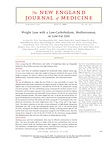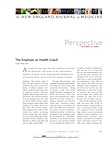
Shai, Iris, Dan Schwarzfuchs, Yaakov Henkin, Danit R. Shahar, Shula Witkow, Ilana Greenberg, et al. “Weight Loss with a Low-Carbohydrate, Mediterranean, or Low-Fat Diet.” N Engl J Med 359, no. 3 (July 17, 2008): 229-241.
“The Employer as Health Coach,” October 11, 2007.
I initially reviewed this article for my interest in the question, “What kind of diet is best for losing weight?” (with good news for low carbohydrate and Mediterranean dieters), but I quickly became fascinated with the way this study was performed – on the worksite, at the Nuclear Research Center Negev, in Dimona Israel.
To quote:
As Okie recently suggested, using the employer as a health coach could be a cost-effective way to improve health. The model of intervention with the use of dietary group sessions, spousal support, food labels, and monthly weighing in the workplace within the framework of a health promotion campaign might yield weight reduction and long-term health benefits.
I think this is as significant as the weight loss intervention itself – that the study authors worked to modify the work environment to support the study aims. In the supplemental materials (linked here), you can see an example of the signage placed in the cafeteria to alert employees to the different food choices available, depending on which arm of the study they were in.
I think this fact of the study design is under-emphasized and marks an important trend in supporting interventions like this moving forward. With thanks to the Research Center in Dimona for teaching the world about more than nuclear science.

3 Comments
One of the things I like most about this blog is that it covers a wide range of topics, and yet they all have threads that connect them related to efficiency, choice, quality, and patient engagement. The NEJM article on weight loss is a nice example. The supplementary materials on cafeteria signage shows a simple yet effecctive way to give people information quickly that allows them to make more informed decisions. I'm working on a project to provide HIV+ patients with information about their medication adherence in a very quick and visual form. The NEJM article is giving me some good food for thought.
Thanks, Keith!
Depending on the issue, I calculate myself at being between 1 and 3 years ahead of my time, so I appreciate that you are able to find a linkage. Thanks for following and for your work in informing patients and keep more ideas for me & others coming,
Ted
This would also be a good initiative to apply to schools. Even primary school children could benefit from a simplified version with pictures. It would reinforce any heathy eating information given in class.
As for regular weighing this has been suggested for schoolchildren in the UK but the idea proved controversial.